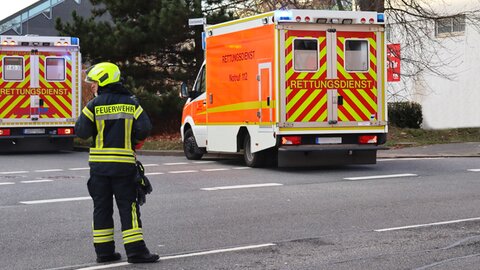
Safety and Hygiene in the Emergency Medical Services
- Home /
- Segment solutions /
- Infection Prevention /
- Emergency services
Reduce infections in emergency services
- Transmission-associated contacts occur during ambulance transport and especially during EMS care. Each contact carries the risk of transmitting pathogens and causing infections. The patient's risk of infection is usually unknown, so all hygiene measures must be taken to prevent infectious diseases, especially in emergency medical services. Consistent hygiene management and implementation of a hygiene concept to protect patients and EMS personnel from infection is essential.
- To this end, we provide you with a coordinated disinfectant program with a comprehensive effect and thus support EMS personnel in the preventive and sustainable implementation of the necessary hygiene management through cleaning and disinfection. You take on important hygiene management tasks, such as disinfecting vehicles and equipment. There is a responsibility to ensure infection control in EMS through hygiene measures.
Disinfection for ambulance and ambulance transport
Pathogens can remain infectious on surfaces for up to several months. For example, noroviruses can survive up to 7 days, staphylococci including MRSA up to 7 months, and pseudomonads up to 16 months on surfaces such as patient transport surfaces. To protect against infection, it is critical to inactivate these pathogens on surfaces. To achieve this, surfaces must be disinfected with a disinfectant that is appropriate for the risk situation. In addition to the required spectrum of activity, criteria such as material compatibility, exposure times, odor, user comfort and application form of the disinfectant must also be taken into account when selecting a product to ensure the necessary hygiene. Dr. Schumacher's core program offers a wide range of products for surface disinfection: The selection ranges from ready-to-use solutions and pre-impregnated wipes to concentrates and fleece wipe dispenser systems.
Ensure hygiene safety
Medical devices can also become contaminated with pathogens and cause infections in patients and staff. To ensure protection against infection, medical devices must be carefully reprocessed before reuse. The German Medical Devices Act (MPG) and the recommendation "Hygiene Requirements for the Reprocessing of Medical Devices" published jointly by the Robert Koch Institute (RKI) and the Federal Institute for Drugs and Medical Devices (BfArM) regulate the reprocessing of instruments. The RKI distinguishes between three different categories of medical devices: non-critical, semi-critical and critical. Depending on the classification, special reprocessing is recommended.
Full range of services
Ancillary services round out our EMS offering. Among other things, we are available to provide information and advice, to draw up area-specific disinfection plans and to carry out training.